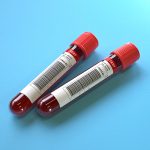-
Family of Henrietta Lacks Works for ‘Health Intelligence’
Alfred Lacks Carter Jr. and other family members honor the legacy of Henrietta Lacks by helping others better understand their health care.
by Kevin McLaughlin
-
May 9: The Week in Cancer News
A single dose of HPV vaccine is highly effective, and not all cancers are increasing in people under 50.
by Kevin McLaughlin
-
May 2: The Week in Cancer News
Immunotherapy may treat some early-stage cancer patients without the need for surgery, and exercise found to counter many side effects of cancer treatment.
by Eric Fitzsimmons
-
Researchers Tackle Immune-related Adverse Effects
Scientists present data on the risks of immune checkpoint inhibitors so more patients can tap into the treatment.
by Marci A. Landsmann
-
Tissue and Liquid Biopsy for Targeted Therapy
Tailored treatments led to better outcomes than standard of care when biomarker results from liquid biopsy and tumor tissue aligned.
by Eric Fitzsimmons
-
Cancer Vaccines Show Promise in Early Trials
While mRNA vaccines offer a personalized approach to triggering an immune response, peptide vaccines could be a one-size-fits-all treatment. Researchers are exploring both options.
by Thomas Celona
-
Declining Breast Cancer Mortality in Younger Women
U.S. breast cancer deaths declined for women ages 20 to 49, which researchers credit to wider screening and better treatment.
by Kevin McLaughlin
-
Missed Activities Due to Cancer-related Fatigue and Depression
Women were more likely than men to have fatigue or depression linked to cancer, and both effects were linked to people withdrawing from physical activities.
by Eric Fitzsimmons
-
Immunotherapy Improves Results in Head and Neck Cancer
Combining an immune checkpoint inhibitor with standard care extended event-free survival by nearly two years.
by Thomas Celona
-
Federal Support for Cancer Research Takes the Stage at AACR Annual Meeting
Scientists and former administrators gather for session focused on advocating for cancer research in uncertain times.
by Kevin McLaughlin
Cancer Talk
Lessons From 20 Years Living With Cancer
Multiple myeloma survivor Jonathan Gluck reflects on uncertainty, and the scientific progress that has kept him living with cancer for more than two decades.
by Eric Fitzsimmons
The Enduring Importance of Cancer Disparities ResearchOpening session from AACR conference highlights how perseverance and adversity have informed cancer disparities research over the years.
by Eric Fitzsimmons
Most Cancer Survivors Don’t Meet Healthy Diet GoalsDespite research linking fruits and vegetables to cancer survival, many people do not change their eating habits after diagnosis.
by Darlene Dobkowski
Many People Don’t Get Colonoscopy After Receiving Abnormal Blood TestsAbout half of people who receive abnormal results from colorectal cancer screening tests don’t follow up with a colonoscopy.
by Laura Gesualdi Gilmore














